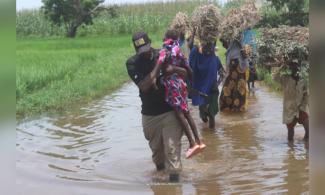
The report also highlighted the widespread destruction caused by the floods, with 107,652 hectares of farmland and 80,049 houses destroyed.
The National Emergency Management Agency (NEMA) has reported that severe flooding has led to the deaths of 179 people and the displacement of 208,655 others across 22 states in Nigeria so far this year.
The figures were disclosed in NEMA’s 2024 Flood Updates released Wednesday.
The report also highlighted the widespread destruction caused by the floods, with 107,652 hectares of farmland and 80,049 houses destroyed.
The most severely affected states are predominantly located in the northern region of the country, with the flooding being attributed to unprecedented rainfall and the rising water levels of the Niger and Benue rivers.
NEMA's update detailed that the flooding incidents occurred in 137 local government areas across 28 states.
The National Emergency Management Agency (NEMA) reported that a total of 86,000 people have been affected by recent disasters in Bauchi, followed by Zamfara with 75,000, Sokoto with 74,000, Jigawa with 57,000, Niger with 30,000, Kano with 19,000, Imo and Adamawa each with 18,000, Ondo and Borno both with 17,000, Taraba with 16,000, Kwara with 12,000, Katsina and Yobe each with 11,000, Gombe with 10,000, Benue with 10,000, Lagos with 9,000, Enugu with 8,000, Kaduna with 7,000, Nasarawa with 6,000, Bayelsa with 5,000, Ekiti and Kebbi each with 4,000, Oyo and Kogi each with 2,000, Ebonyi and Akwa Ibom each with 2,000, and the Federal Capital Territory (FCT) with 1,000.
Jigawa State reported 34 fatalities, followed by Bayelsa and Kano with 25 each, Bauchi with 23, Taraba with 15, Zamfara with 13, Sokoto and Yobe each with 10, Adamawa with 7, Katsina and Niger each with 5, Borno, Ebonyi, and Kaduna each with 2, and Nasarawa with 1.
The agency also noted that Sokoto recorded the highest number of displaced persons at 41,000, followed by Bauchi with 35,000, Zamfara with 32,000, Niger with 28,000, Jigawa with 16,000, Imo with 12,000, Taraba with 8,000, Borno with 7,000, Bayelsa with 5,000, Enugu with 4,000, Adamawa, Yobe, and Nasarawa each with 3,000, Benue, Ondo, Katsina, Ebonyi each with 2,000, and Gombe, Kebbi, Kano, and FCT each with 1,000.
NEMA reported that approximately 50,000 hectares of farmland were affected in Bauchi, followed by Taraba with 21,000, Jigawa with 10,000, Sokoto and Niger each with 9,000, Kano with 3,000, Zamfara with 2,000, and Gombe, Adamawa, Enugu, and Kebbi each with 1,000.
The destruction of houses was significant, with Bauchi experiencing 18,000 destroyed homes, Sokoto with 10,000, Jigawa with 8,000, Niger with 7,000, Enugu with 6,000, Borno and Zamfara each with 4,000, Kwara with 3,000, Kano, Yobe, and Katsina each with 3,000, Ondo, Kogi, and Kaduna each with 2,000, Oyo and Imo each with 1,000, along with Gombe, Kebbi, and FCT each with 1,000.
NEMA Director-General Zubaida Umar mentioned the agency's disaster assessments across almost all states and highlighted funding as a major challenge impacting operations.
Chief of Staff to the President, Femi Gbajabiamila, suggested the creation of a law to ensure states remit counterpart funds to support NEMA's activities, emphasizing the need for innovative funding solutions given the current financial constraints.
President Bola Ahmed Tinubu on Wednesday expressed condolences to victims and pledged ongoing support for affected families.
He emphasised the need for environmental resilience and timely warnings to mitigate disasters.
NEMA has cautioned that severe flooding could worsen in September and October, with spokesperson Manzo Ezekiel indicating dire conditions in the northern states.
Meanwhile, over 41,000 people have been displaced, and extensive farmland damage has occurred.
Agriculture and Food Security Minister Abubakar Kyari warned that this year's farm harvests might be adversely affected, potentially impacting farmers' well-being.
He stressed the government's commitment to investing in technologies to help farmers adapt to climate changes and reduce future impacts. Additionally, efforts to boost dry-season farming are underway to enhance food production.
Follow the Sahara Reporters channel on WhatsApp: https://whatsapp.com/channel/0029VaFClvtH5JM6SSsP7M2Y